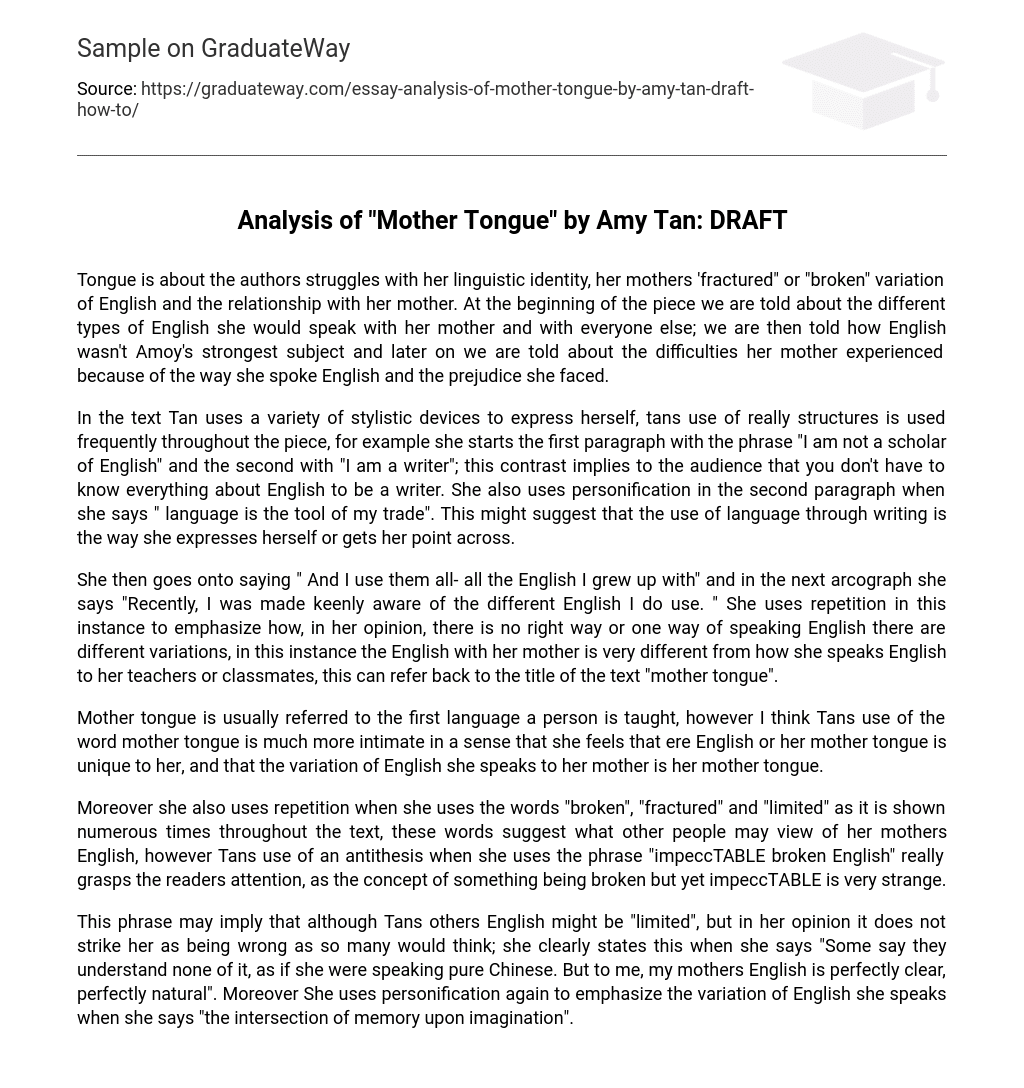Tongue is about the authors struggles with her linguistic identity, her mothers ‘fractured” or “broken” variation of English and the relationship with her mother. At the beginning of the piece we are told about the different types of English she would speak with her mother and with everyone else; we are then told how English wasn’t Amoy’s strongest subject and later on we are told about the difficulties her mother experienced because of the way she spoke English and the prejudice she faced.
In the text Tan uses a variety of stylistic devices to express herself, tans use of really structures is used frequently throughout the piece, for example she starts the first paragraph with the phrase “I am not a scholar of English” and the second with “I am a writer”; this contrast implies to the audience that you don’t have to know everything about English to be a writer. She also uses personification in the second paragraph when she says ” language is the tool of my trade”. This might suggest that the use of language through writing is the way she expresses herself or gets her point across.
She then goes onto saying ” And I use them all- all the English I grew up with” and in the next arcograph she says “Recently, I was made keenly aware of the different English I do use. ” She uses repetition in this instance to emphasize how, in her opinion, there is no right way or one way of speaking English there are different variations, in this instance the English with her mother is very different from how she speaks English to her teachers or classmates, this can refer back to the title of the text “mother tongue”.
Mother tongue is usually referred to the first language a person is taught, however I think Tans use of the word mother tongue is much more intimate in a sense that she feels that ere English or her mother tongue is unique to her, and that the variation of English she speaks to her mother is her mother tongue.
Moreover she also uses repetition when she uses the words “broken”, “fractured” and “limited” as it is shown numerous times throughout the text, these words suggest what other people may view of her mothers English, however Tans use of an antithesis when she uses the phrase “impeccTABLE broken English” really grasps the readers attention, as the concept of something being broken but yet impeccTABLE is very strange.
This phrase may imply that although Tans others English might be “limited”, but in her opinion it does not strike her as being wrong as so many would think; she clearly states this when she says “Some say they understand none of it, as if she were speaking pure Chinese. But to me, my mothers English is perfectly clear, perfectly natural”. Moreover She uses personification again to emphasize the variation of English she speaks when she says “the intersection of memory upon imagination”.
Towards the fifth paragraph Amy uses many anecdotes or personal experiences to give the audience a bit more of an insight with the troubles he faced when she was younger with her mother and the prejudice she faced. Furthermore Mays use of dialogue throughout the text lets the audience experience her mother tongue. Think that the main purpose of this article is to show people that there is no right type of English, and that English comes in many forms therefore there should be no prejudice.
She shows this by putting emphasis on the word “English” and “English” throughout the text. Tan implies that many people have very narrow minded and misconceived views of people from a different culture or language background, she uses the example of her personal experience and mother to show this, for example people would take her mother seriously due to her “broken” English, as it suggests that her mother might be uneducated.
However Tan also mentions how her mother “reads the Forbes report, listens to Wall Street Week, converses daily with her stockbroker and reads all of Shirley Machine books with ease- all kind of things I can’t begin to understand”, most of the audience might be quite surprised with this, as it seems very unusual for a women from China and who has “watered-down” English to understand things of such complexity. This in itself proves Tans point of society’s misconception and generalization of people with different language backgrounds.





